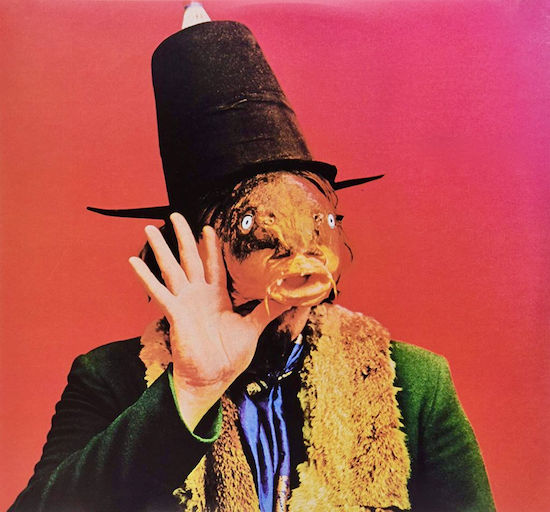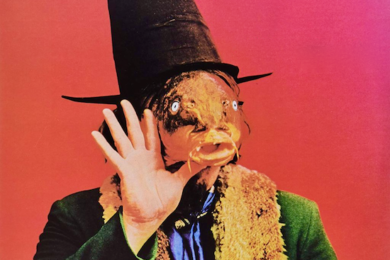Of course, these weren’t “songs” in the sense of the conventional components (intro, verse, chorus, bridge etc.). Songs generally were much simpler but more organizationally structured. “Songs” had a set of chord changes 12 to 16 bars long that were played through about 4 times (the basic framework of the song). “Songs” usually had a “riff” or “hook” (usually played during the tonic, or root chord, the tonal center of the piece) that was played through in between verses and at the beginning and end.
These “compositions” of Don’s were almost all riffs (short one and two measure phrases of music) and often there was no tonal center, or it randomly changed from section to section, or there were three tonal centers at the same time in a particular section. It was as though someone had taken a blank jigsaw puzzle, randomly picked up pieces and scribbled little pictures on each one, and said, “Put this together, I’ll be out later to see the thing when it’s done.”
In this sense, one can say that Don did not fully “compose” the music on Trout Mask Replica. In order to actually “compose” a piece of music, one must actually conceive of it as a whole and place it within a framework (which I would liken to the edge of a jigsaw puzzle) presenting a completed piece to the musicians, which is how Zappa wrote much of the time. What Don basically did here is find a series of one or two bar riffs, or parts, that he liked, have me write them down, and then say, in essence, “make something out of this.”
In a quote from Rolling Stone magazine, however, here is what Don decided to lead the public to believe:
When Beefheart learned of the opportunity to make an album totally without restrictions, he sat down at the piano and in eight and a half hours wrote all twenty-eight songs included on Trout Mask. When I asked him jokingly why it took that long, he replied, ‘Well, I’d never played the piano before and I had to figure out the fingering.’ With a stack of cassettes going full time, Don banged out Frownland, Dachau Blues, Veteran’s Day Poppy, and all of the others complete with words. When he is creating, this is exactly how Don works – fast and furious.
And later:
The trouble is that once the compositions are down it takes him a long time to teach them to his musicians. In this case it took almost a year of rehearsal.
As one can imagine, it was pretty frustrating for me to read this later on, as I had really toiled within my role and vision to make certain that everyone knew what they were supposed to do at any given moment.
Occasionally, as Don would write, he would say, “this is a bass part,” or “this is Bill’s part.” He often complained that he had to “write those fucking blues parts” for Bill Harkleroad. Actually, I find little on Trout Mask that sounds like a “blues part.” I find an overall abstract relationship to blues in much of the music, due to Don’s influences in youth, but I also find bits of jazz influence, and even classical influences all thrown together.
Bamberger writes in his book, Riding Some Kind of Unusual Skull Sleigh that what Don actually wrote was “chamber music” for the group. I disagree. Chamber music is a much more disciplined form, for the most part, and follows much stricter rules. All the sections fit together to make a whole and the parts and sections are much more defined and complimentary to one another, following chord patterns which are repeated. If Van Vliet had written “chamber music” as Bamberger suggests, it would have taken us much less time to learn than trying to figure out how to put together the fragmented bits and pieces he actually did give us.
This music was more random, and if I may be so bold to suggest, the complexity of the music had as much to do with the fact that Van Vliet didn’t know what he was doing as with anything else. When one simultaneously breaks two or three basic rules of composition in music (which most “rock” bands, even the ones who claim to be “far out”, do not), then the outcome of the music is going to sound more “complex” to the human ear.
Like I said, I came up with a simple process of compiling and teaching this music to the other players, which I explain in more detail in the track notes for Trout Mask. Basically, I worked with common denominators to come up with equal lengths for each section. As a drummer, this kind of thing was mathematically simple and because of the fact that Don had mentioned we were doing a double album and the time it took to learn each piece seemed to be about six to eight hours, depending upon the piece, I figured we had a couple of solid months of work just to actually assimilate the material, but months of work lay ahead in memorizing the hundreds of riffs that make up the whole. This was going to be a daunting task.
Remember, since these guys didn’t read music (well, at least they weren’t reading the music I transcribed, though I think Bill and Jeff must have had a general knowledge of theory), they had to memorise everything, which was a process in itself. There was also the general human error of forgetting a section or two and mixing up the order, so, after a few days, I realized that my job was going to be even more complex. I had to transcribe, then arrange and teach simultaneously, and then I also had to keep meticulous track of all the parts in the exact order that I taught them to each player for later reference. To make matters worse, I had to come up with working titles for each piece, so that I would know where one song ended and the next began, as Don seldom gave a title to anything. I should have just numbered them, but I would usually put something on the paper to remind myself of something that happened that day, or something that was impressed on my mind so that I could recall the piece to mind more quickly.
All this started out of one half of a used manuscript book and a broken pencil and no eraser. I soon saw that the best method for doing this was to re-write everything from the rough draft once the arrangement was decided laid out.
Often, (and I started with Steal Softly) if a part didn’t seem to fit with another part, I would search until I found something that would work. This often took a few minutes, and I always assumed that if Don didn’t like what he heard, he would just tell me, “That doesn’t go with that, I meant this to go with that” or something to this effect. However, that never happened, even once, that I recall. This could have been for several reasons. One is that he just didn’t know how things were supposed to go together. Another possibility is that he didn’t care how things went together. Another is that he didn’t remember enough about what he had written to know the difference.
Bear in mind, however, that Van Vliet would also listen to a player occasionally and give a critical assessment of how he was playing a particular part, but this often had more to do with nuance than the actual notes. If he didn’t like the way the part sounded on guitar, he would work with the player, sometimes re-writing and/or simplifying the part, and then I would generally ask the player to show me the new part so I could write it down. Sometimes, Don would spend hours just working with someone on nuance and feel, just to get the part working correctly. Most of the time, the guitars weren’t plugged in, so the sound he would “pull out of the players” would be strictly technique, never gimmicks or electronics. This was his area of strength: feel, nuance, dynamics, and instinctual characteristics, the same thing one hears in his extraordinary voice.
Beefheart: Through The Eyes of Magic by John ‘Drumbo’ French is published by Last Music Company



